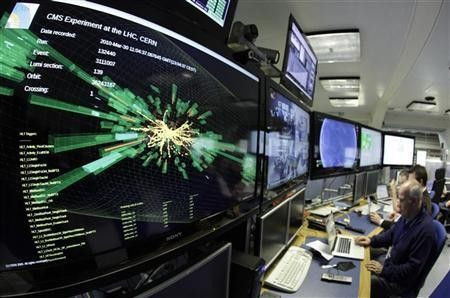CERN Set to Report Probable Higgs Sighting This Week

(Reuters) - Scientists predicted this weekend that sighting of the first strong signs of a particle vital to support Einstein's ideas on the working of the universe will be reported Tuesday by the CERN physics research center.
While warning there would be no announcement of a full scientific discovery, they said even confirmation that something like the long-sought Higgs boson had been spotted would point the way to major advances in knowledge of the cosmos.
"I am feeling quite a level of excitement," Oliver Buchmueller, a senior member of one of the two teams seeking the particle amid vast volumes of data gathered in CERN's Large Hadron Collider (LHC) this year, told Reuters.
And science bloggers with close contacts among the tight-lipped front-line research groups, known as ATLAS and - Buchmueller's - CMS, said their understanding was that both had found signals that look very much like the Higgs.
"The anticipation among physics enthusiasts is almost palpable," said theoretician Sascha Vongehr on his blog, www.science20.com. The observation of a "light Higgs" would be announced at a December 13 CERN seminar, he said.
CERN's director general, revealing the seminar would be given updates on the Higgs search by the heads of the ATLAS and the CMS groups who work independently and in secret from each other, said there would be no discovery announcement.
For that, there would have to be a high degree of certainty - measured at 5 sygma - by both. Informed bloggers are saying it is hovering at about 2.5 sygma for CMS and 3.5 for ATLAS - enough to qualify the sightings as "an observation."
CONCLUSION EARLY NEXT YEAR
But, said Buchmueller, without confirming that reading for his own team, if the ATLAS group had found signals similar to those seen in CMS, "then we're moving very close to a conclusion in the first few months of next year."
The boson was posited in 1964 by British physicist Peter Higgs as the agent that gave mass to matter in the wake of the Big Bang 13.7 billion years ago, making possible the formation of stars and planets, and eventually the appearance of life.
But efforts since the mid-1980s to find the particle in the U.S. Tevatron collider and the LHC's predecessor at CERN, the LEP, and prove Higgs correct by smashing particles together and creating mini Big Bangs, have until now failed.
The boson has been called the "capstone" of Albert Einstein's universe of elementary particles and three fundamental forces that control the cosmos under the "Standard Model" finalized by physicists in the 1970s.
The Higgs particle was the missing linking brick in this architecture.
Its discovery, if eventually confirmed and especially if it is at the low mass levels where bloggers are saying ATLAS and CMS have found it, would open the way to what CERN calls the "New Physics" of super-symmetry and dark matter.
Some top scientists, such as Briton Stephen Hawking, have long voiced doubt that the boson exists and should be replaced in the Standard Model by something else.
But in an interview in the December edition of the British monthly Prospect, the 82-year-old Higgs - who has been tipped for a Nobel prize - said that "if you tried to modify the theory to take it out, the whole thing becomes nonsense."
© Copyright Thomson Reuters 2024. All rights reserved.




















